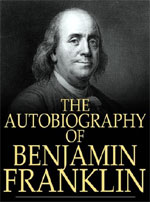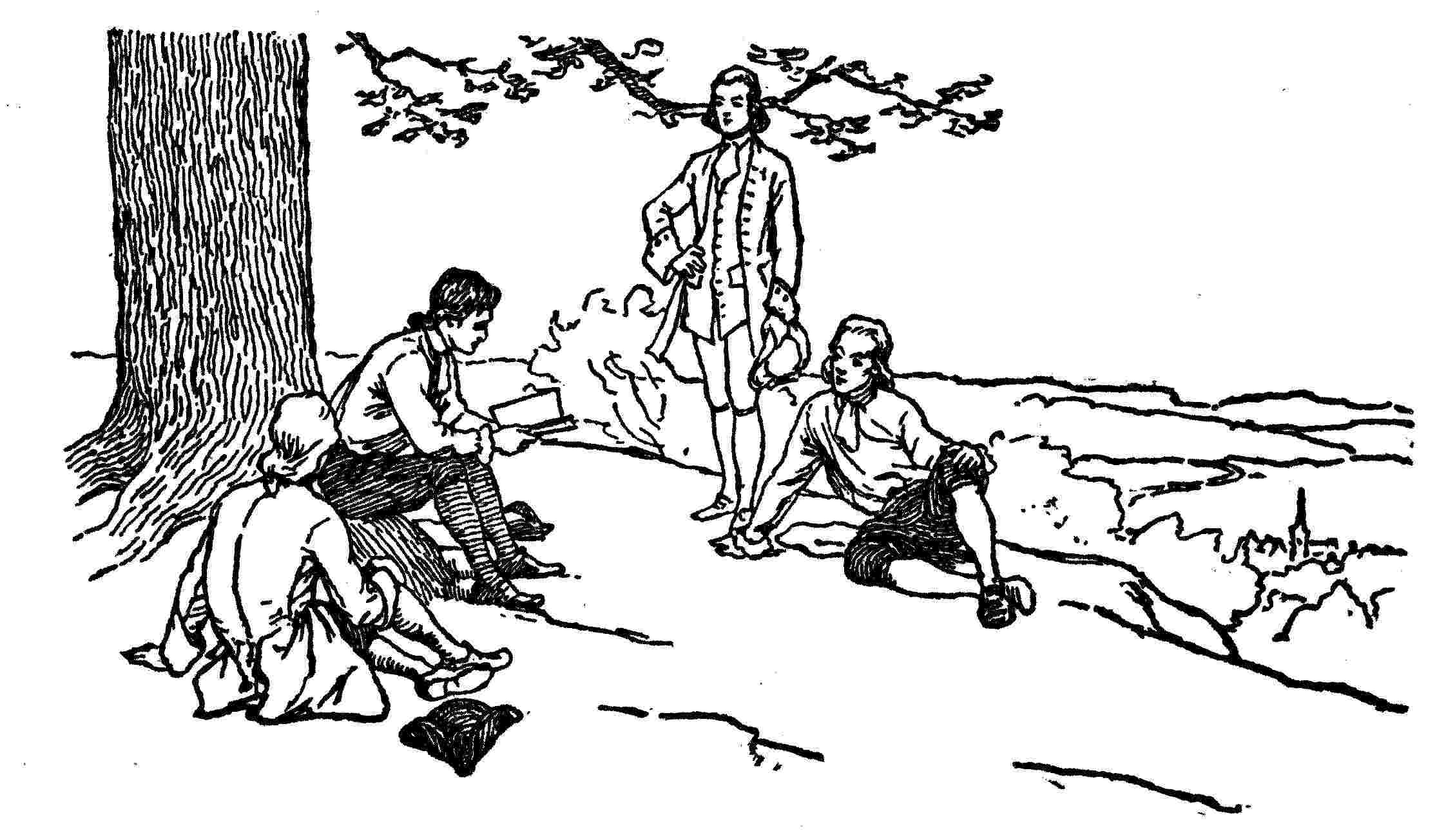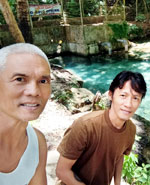

FREE online books
BooksFree.org | Project Gutenberg | Open Library | ManyBooks | Free-eBooks.net | Bookboon | Smashwords | PDFBooksWorld | PDF Drive | Google Books
 November 30, 2023
November 30, 2023
The Autobiography of Benjamin Franklin
Author: Benjamin Franklin (Jan 17, 1706 - Apr 17, 1790)
Genre: autobiography, colonialism, American revolution, politics
Pages: 135 pages
Country: USA
Publisher: The Quinn & Boden Co. Press
Publication date: 1916
Rating:
![]()
![]()
![]()
![]()
![]() (5 out of 5 stars)
(5 out of 5 stars)
Read the Book Online
(Project Gutenberg)
Recurring Theme
Benjamin Franklin became a recurring name thrown at me. First, while watching an interview of billionaire Charlie Munger, he said he kept 2 busts in his home of 2 people he admired the most - Benjamin Franklin and Lee Kuan Yew. On a '19 Recommended Books to Read in your Lifetime', I saw Benjamin Franklin's Autobiography. And while watching the American Revolution, Benjamin loomed larger than life. While watching an interview of celebrated author Walter Isaacson who was promoting his recent book about Elon Musk, I learned that he also authored a Benjamin Franklin biography! In my world-view of a benevolent universe blazing a path for me, this is a strong statement that I should roll up my sleeves and get to know Benjamin Franklin in an intimate way - by reading, summarizing and reviewing his autobiography.

Human Swiss Army Knife
After watching the docu-series, The Revolution, I thought Franklin would be a fitting president next to George Washington. He could also be a great Secretary of State - he was a savvy diplomat who possessed the virtues of patience, cunning and tenacity. He was calculating, wise as he was politically astute.
But Franklin was more than just a polician. He was a famous scientist, known for taming lightning. He was also a philosopher and an author who penned Autobiography, Poor Richard, Father Abraham's Speech and The Way to Wealth. He invented the Franklin Stove and the bi-focal lenses. He never patented any of these - as gifts to humanity.
American Revolution
Franklin wasn't on the battlefield of the American revolution (unlike George Washington), but the success of the revolution may be put in question without the adept maneuverings of Franklin behind the scenes as the crafty ambassador to France and Britain. He is the only one whose signature is on the 4 most important documents in gaining independence for America and founding what was to become the greatest of nations in its time - the Declaration of Independence, the US Constitution and the Treaty of Alliance with France, and the Treaty of Paris. In all certainty, he is one of the greatest of the Founding Fathers of America.
Vocabulary
When I read a book, I make it a point to write down the words unfamiliar to me and look up its meaning and use. This way, my vocabulary expands. -- Gigit
- burlesque - dramatic or musical literature making a mockery of something puported to be exalted
Eg. Franklin's burlesque writing style made for great newspaper narrative
I initially thought burlesque was only about striptease, thus I looked it up since it didn't seem to fit the context - cogent - clear, logical and convincing
Eg. Franklin's cogent reasoning - facile - easy, simplistic
Eg. Franklin's facile pen
Facile is actually a French word meaning 'easy', Difficile meaning 'difficult' - felicity - intense happiness
Eg. Franklin went through life with a considerable share of felicity - fortitude - courage in pain or adversity.
Eg. Franklin's fortitude to the cause of his country - posterity - for all future generations of people
Eg. Franklin wrote his autobiography for posterity
Introduction
A Man For the People
This book is not a "Do It Yourself" hack through life, but simply a companion to gain insight about life, from the lenses of a man who has 'risen from obscurity and poverty to eminence and wealth'. There are many such self-help books but they mostly lack the human-element. This book is was written in conversational style with flesh and blood that relates to everyone, big or small. The vanity about Franklin is not for self-aggrandizement but simply to be faithful to the narrative.
The Story of the Autobiography
The book started out as a letter to his son, William Franklin - it was not intended to be a book. The manuscript evolved to be intended for publishing. Franklin was already 65 when he began to write it. It floundered for over a decade because of the struggle for independence. The writing resumed 13 years later upon the behest of a friend. He completed it at age 88 when he was already old, feeble and not in the best of health.
The book has been reprinted many times in the US and translated into all the languages in Europe.
1. Ancestry and Early Youth in Boston
Humble Origins
Franklin begins to write to his son William in 1771 (Franklin is 65 years old) and explains his motivation for writing about his life story, especially the areas William may be unfamiliar with. Franklin finds fulfillment in becoming prosperous and recognized particularly since he came from humble beginnings. He hopes that future generations benefit from lessons he learned in his lifetime through the book. Franklin acknowleges at the same time that vanity plays a part in it - it cannot be helped.
Life: Version 2
If Franklin would be allowed to live his life all over again, he would do so willingly, but improve on his mistakes, in the same way an author can improve the previous edition by making corrections in the 2nd edition.
Instrument of the Divine
Franlin remains humble and grateful to God, acknowledging that his accomplishments came from a divine mandate. He hopes that his happiness continues but everything is God's will.
Lineage from Ecton
Franklin's lineage dates back to 1555 in Ecton where the word "Franklin" meant owner of a small patch of land - it was later on adopted as a surname. Franklin is keen on his family's history and made effort to preserve and trace the lineage.
Franklin's grandfather was a smith. His sons Benjamin and Thomas were dyers. Josiah, Franklin's father made candles and soap. Franklin was the youngest of 17 children (17? seriously?). He was taken out of school because college was unaffordable and began trade as a cutler (sharpens knives, scissors, and other cutting tools). He disliked it and soon became a printer.
2. Beginning Life as a Printer
Franklin was apprenticed to his brother James in the printing trade. He developed a love for reading books and learning. Because of disagreements, he left for Philadelphia to work for another printing shop where he learned the business in depth (writing, production, customer management, inventory, etc.) and developed connections with other printers. He worked hard and was smart with his money. He pursued his love of writing, reading and learning. He assumes the pseudonym, Mrs. Silence Dogood, to write anonymously for his brother's newspaper - he did this to avoid jealousy. Franklin eventually gained a reputation as a young talented writer in Boston. He soon took over his brother's business and established a separate business of his own - The New-England Courant and The Pennsylvania Gazette. He gained wealth and prosperity.
He also established a club, Junto, whose main objective is to provide community to like-minded people who wish to improve themselves.
LESSONS
Lifelong Learning and Hard Work
During this time, he learned the value of continuous learning to improve oneself and the value of hard work. He was keen on understanding the nature of what he was doing and not just mechanically laboring. This became the cornerstone of his work and self-development ethics. Lesson? In this fast-changing technological landscape, learning has to be a lifelong activity. As Charlie Munger says, "Just keep plugging, learning something new everyday. You'll surprise yourself."
Power of the Pen and Communication
Through Franklin's poems, articles and essays, he was able to influence public opinion - it was powerful. His writings allowed him to inform, persuade and convince. This was a skill he honed. It served him well in the future. Lesson? The adage goes that the pen is mightier than the sword. If you can be more persuasive with your pen, write instead of talk.
Whenever I feel shortchanged, I call the attention of the employee. If I get a push-back instead, I would write the company. This produces the positive results I was seeking. To verbally confront the employee would have only increased the hostility without arriving at a reasonable outcome.
Mentorship
Franklin became an apprentice to his brother where he gained knowledge and experience. He learned from those who knew better. He took their counsel instead of trying to impress them with what he knows, or worse, pretending to know better.
This is not exactly mentorship, but I'm learning to keep my mouth shut and instead, listen. I try to probe what was said by asking questions. I do not argue and I try to be pleasant even though I'm being triggered. This has produced almost miraculous results. Before, I attempt to do all the talking, trying to impress them with what I know, and even hinting contempt if I find their argument inferior. I never gained friends that way - only pseudo-friends who pull me down in my moment of weakness. Besides, nobody really cares what I think, so why presenting it in the first place? If they want to hear me out, they have to ask for it, or better, pay for my time.
Seizing the Moment and Persevering
When his brother was jailed for libel, Franklin took over the business and applied himself. He persevered to learn the business. He soon became influential and wealthy. Lesson? Life presents a red-pill moment every once in a while. You can seize it or continue the status quo (blue pill). Life is a culmination of the choices you made - it's not deterministic. Reality as it unfolds, is fluid and malleable.
Frugality
Franklin was wise in spending his money. If there was no need to spend it, he saves it.
I'm frugal by nature but more so in the last 2 decades when I didn't really have any kind of steady job. Even if I make good money for a project, I still don't know when I'll make my next money or how much. Thus to be prudent, I cannot splurge and have to remain frugal. Frugality also unveils a layer of reality not commonly perceived. You get to discern desire vs. need.
Sense of Urgency
Franklin talks about Time is Money. This can also be described as Procrastination is the Thief of Time. Lesson? Do now what needs to be done. Delay, and the moment might come and go. I've lost count on the number of times I hesitated or wavered until the moment slipped away, never to present itself again. The worst thing in life is to ask yourself, "What could have been?".
Building Relationships:
Franklin interacted with fellow printers and other influential people in the community, forging positive relationships and connections that proved useful in his future endeavors.
Lesson? In the default world, allies take you ahead of the game. That's why people band together to form secret societies, fraternities, and brotherhoods. Or, leaders build a team of reliable people and move on with a common objective. Collectively, the output is more.
I'm essentially a lonewolf by nature. Lonewolves are rare and hardly successful. They have a limited range of options. But that is not to say they cannot be successful - it's just not the norm. For me, instead of running a business where I have to guard against employees who might steal or malinger, worry about government control, deal with a landlord's escalating rent, or remain vigilant against being defrauded by a partner, I simply gravitate to a business model where it's just me and no one else - no stockholder, no police knocking on my door at Christmas, no inventories to push out of the warehouse, etc.
However, with my new mantra of shutting up and listening to learn more, I'm essentially developing relationships whereas before, they just find me impertinent and egotistical. Already I feel the advantage of this approach to life. Lately, I'd been invited more to gatherings, gifted more and sense a greater degree of accommodation than what I had been used to. Instead to showing people how smart I am, I make them feel I'm listening to them by asking relevant questions while keeping my opinion to myself (this is challenging when I have a point to make). I build better relationships this way even though that's not the objective (the objective being, not to antagonize people unneccessarily).
Adaptability
When Franklin took on the printing business, he didn't really know much about running a business. But he took on all the challenges, learning and adapting to the demands of the new job.
When I was still in Chiang Mai, Mike (my host) would ask me to help him in a little way. But I couldn't be useful unless I study the entire system. I learned many new things this way - the document flow in the shipping industry, how to maintain a fish pond, etc.
Staying True and Authentic
Franklin chose to go about his way instead of compromising with his brother. He stayed true to his true nature.
I remember defying the one person I hero-worshipped all my life - my Dad. He wanted me to side with him over something I believed was wrong. He questioned my loyalty and threw me out of the house. That severed my relationhip with him. Had I buckled down, I don't think I would have felt good about myself. At a much later point, it was proven I was right. But that didn't restore my relationship with him. Still, I'm glad I stood my ground.
Not Hugging the Limelight
Franklin chose to write anonymously to avoid envy and jealousy. Lesson? Your friends and associates will wish for your happiness, prosperity and well-being as long as it does not exceed theirs. Once you exceed that threshold, they'll still smile in front of you but there is now a hidden envy underneath. When the moment of weakness comes, they'll pull you back to their level. Stay humble and be 'anonymous'.
Valuing Reputation
Franklin was careful in keeping his good name - through integrity, ethics, public service, etc. Lesson? When you're name is in the mud, it doesn't matter how brilliant you are. People will not do business with you nor associate with you. Even if you can rationalize something to fall in your favor, it's a good idea to place yourself in the other guys's shoes. Would you now want to be on those shoes? Make sure you play to win, but when you win, ensure nobody loses.
Public Service
Franklin extended himself in the service of the community. He founded a club whose main objective is self-improvement. Lesson? Spread the love. See how you can be of service to the community, or give service for the greater good.
This chapter offers insight into Franklin's early years and the lessons he learned as he embarked on his career. It provides a foundation for understanding Franklin's character, work ethic, and principles that would shape his remarkable life. The lessons learned from this chapter include the importance of entrepreneurship, continuous learning, ethical conduct, adaptability, and the value of building positive relationships.
3. Arrival in Philadelphia
 Summary
Summary
(1723, age 17) This chapter recounts Franklin's journey to Philadelphia and his early struggles and successes. Philadelphia would become his home for the rest of his life, and it would play a major role in his personal and professional development. Franklin's experiences shaped him to be the successful and influential figure he would become. This chapter offers valuable insights into his character, personality, and resourcefulness.
Leaving Boston
After a falling out with his brother and mentor, James, he left Boston to try his luck in Philadelphia. The journey wasn't easy - bad weather, sea sickness, and lack of money. He worked as a sailor to earn his keep and sold his belongings to make ends meet.
Independence: Franklin was willing to be on his own rather than buckle-down to his brother's wishes.
Philadelphia
He arrived in Philadelphia penniless and disheveled - no job, no home, and no friends or family. It was an unfamiliar environment but positive - thriving city with busy streets.
Observation: Franklin's keen powers of observation are evident as he walks through the streets of Philadelphia. His observations of people and the city's atmosphere reflect his curiosity about the world around him, a characteristic that defines his later scientific and intellectual pursuits. By being observant, he wasn't a reactionary - thus he could objectively size up the situation and think about his exercisable options.
Recognition and Jealousy
He quickly finds a job at a printer's shop owned by Samuel Keimer. Franklin's skills, hard work, perseverance and work ethic impressed the owners but caused jealousy amongst his colleagues. He developed a reputation as a talented printer and writer.
Interpersonal Dynamics: Franklin's positive relationship with Keimer contrasts with the jealousy and resentment from his coworkers. This foreshadows the challenges he will face in navigating social and professional relationships. When you surpass your friends, colleagues and associates, they become your friends who secretly hate you and can work behind the scenes to pull you down. Keep humble and stay away from people you already know are envious of you.
Learning and Growing
Franklin made good use of his free time by learning everything he could, attending lectures, engaging the intellectuals and immersing himself with the on-goings of the city.
4. First Visit to Boston
Back to Boston on Foot
This chapter recounts Franklin's journey to Boston and his experiences during his initial visit. While working for Keimer in Philly, he impressed Gov Keith who encouraged him to put up his own printing business. The Gov expressed support for him. This motivated Franklin to go back to Boston. Franklin walks the 50-mile distance to Boston (tapas) to save money for books (frugal). He met with his family with James' resentment. He took on various jobs and trades, even working for his brother James (hard work). Franklin gains more experience. He remains frugal about his money. Franklin receives financial support. He moves to New York where he encounters an old friend Colins, who ran away with Franklin's funds (sting of betrayal). In Boston, he continued networking, meeting the influential people who could pull strings (building connection). He impressed Gov Burnett of NY. Keith fell short of his promised financial assistance to Franklin - he was misled and now on his own (consequences of poor decisions). He contemplates on making a trip to London to purchase a printer press to start his own. Franklin reflects on mistakes made that hurt his relationship with his brother (self-reflection). He tried to be vegetarian (not afraid to try new things), but it didn't work for him (internal conflict between personal convictions and social pressures). This stint in Boston primed him for the bigger role he was able to play in Philadelphia.
5. Early Friends in Philadelphia
Summary
(1729, age 23) This chapter chronicles Franklin's social life, early career and intellectual pursuits in Philadelphia.
When he arrived in Philly, he was broke and felt isolated but used his charm and wit to gain new friends.
He met John Reed who became his host. He became close to Deborah Reed, the daughter. He was heartbroken with Deborah Reed married another man.
He had 3 friends in Philly whom he indulged poetry with. He has a keen observation of people as he describes his friends. Watson was a pious, sensible young man, of great integrity; Osborne was sensible, candid, frank; sincere and affectionate to his friends; but, in literary matters, too fond of criticizing. Ralph was ingenious, genteel in his manners, and extremely eloquent; I think I never knew a prettier talker.

He went into a printing partnership with James Ralph. It was an initial struggle, but through hard work, it became profitable. Eventually, disagreements happended, causing the business to dissolve. Franklin consoled himself by diving deep into his writing and founding the The Pennsylvania Gazette, a newspaper that became popular and influential.
Frankliin joined several clubs and social events meeting like-minded people who also interested in self-improvement. Franklin established the Junto Club, a social group for those interested in self-development.
With his love for languages, math and philosophy, he developed the first lending library in Philly. He set a high standard for himself and established a community patrol and a fire department.
This early stage served as foundation for Franklin's social standing and commitment to public service in Philly. With his self-deprecating humour and keen observation of human nature, he became a key figure in Philly's social and intellectual circles.
Ending Thoughts
The biggest difficulty I had was understanding the phrases and words penned in the 18th century - it's old English done in a poetic and flowery way. Often, I would copy and paste sections and ask A.I. to rephrase for me in plain current English. With the help of A.I., I began to understand even the underlying messages of the text.
One distinction I realized is that Franklin loved to learn by reading books. But he was limited by the books available to him. Now, I have A.I. to teach me just about everything I need to learn at the moment - the meaning of a word, the history leading to such an event, analysis, etc. With A.I., I have the world's knowledge at my fingertips.
I also realized that I didn't care so much for the trivial play-by-play storytelling as much as I wanted analysis and insight. I had to skip a lot of the play-by-play parts. On some cases, I just asked AI for analysis of the chapters which I found to be the germ of the entire reading.
--- Gigit (TheLoneRider)
YOGA by Gigit ![]() |
Learn English
|
Learn English ![]() |
Travel like a Nomad
|
Travel like a Nomad ![]() |
Donation Bank
|
Donation Bank ![]()
Leave a comment?
Next story:

![]()

![]()
2023: Peoplescape Yearend Review
(Dec 31, 2023) I was practically a recluse in 2023, holed-up in the small isolated island of Siquijor. This has been a sharp contrast to my social life back in Thailand and Cebu. But perhaps this is what I needed for 2023. I have to move out of Siquijor in 2024 to have more interaction and stimulation...more »»

![]()
![]()
Elon Musk
(April 4 - July 22, 2024) This is a special book to me for its subject (Elon Musk) and its biographer (Walter Isaacson). Elon is perhaps one of the most fascinating guys who ever walked on this planet and nobody writes better than Walter Isaacson....more »»
»» back to Peoplescape
»» back to Book Review
»» back to Homepage
ARCHIVE:
2024 |
JAN |
FEB |
MAR |
APR |
MAY |
JUN |
JUL |
AUG |
SEP |
OCT |
NOV
1970 |
1973 |
1975 |
1976 |
1979 |
1981 |
1996 |
2000 |
2001 |
2002 |
2003 |
2004 |
2005 |
2006 |
2007 |
2008 |
2009 |
2010 |
2011 |
2012 |
2013 |
2014 |
2015 |
2016 |
2017 |
2018 |
2019 |
2020 |
2021 |
2022 |
2023 |
2024 |
ALL BLOGS
